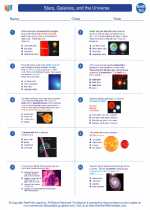Circulation in Earth Science
Circulation refers to the movement of fluids, gases, or other substances in a closed system. In Earth Science, circulation plays a critical role in various natural processes, including the movement of air, water, and heat within the Earth's atmosphere and oceans.
Atmospheric Circulation
The circulation of air in the Earth's atmosphere is driven by the unequal heating of the Earth's surface by the sun. As warm air rises and cool air sinks, a complex system of atmospheric circulation patterns is established. This includes the formation of high and low-pressure systems, jet streams, and trade winds.
Key Concepts:
- Hadley Cells: These are large-scale atmospheric convection cells that occur between the equator and 30 degrees latitude. Warm air rises near the equator, moves poleward at high altitudes, and then descends around 30 degrees latitude.
- Ferrel Cells: These are mid-latitude atmospheric cells that are driven by the interaction between the Hadley and Polar cells. They play a role in the movement of westerly winds.
- Polar Cells: These are convection cells that occur near the poles, where cold, dense air sinks and moves equatorward at the surface.
Oceanic Circulation
The circulation of water in the Earth's oceans is primarily driven by differences in water density, temperature, and salinity. Oceanic circulation plays a crucial role in regulating global climate patterns, distributing heat around the planet, and influencing marine ecosystems.
Key Concepts:
- Thermohaline Circulation: Also known as the "great ocean conveyor belt," this refers to the global density-driven circulation of ocean waters. It involves the sinking of cold, dense water in polar regions and the upwelling of warmer water in the tropics.
- Surface Currents: These are driven by wind patterns and the Earth's rotation. They play a significant role in redistributing heat and nutrients around the globe.
- Upwelling and Downwelling: These vertical movements of water bring nutrients from the ocean floor to the surface, supporting marine life and fisheries.
Study Guide
Here are some key topics to focus on when studying circulation in Earth Science:
- Understand the driving forces behind atmospheric and oceanic circulation, including solar radiation, the Coriolis effect, and differences in temperature and density.
- Learn about the major atmospheric circulation cells, including Hadley, Ferrel, and Polar cells, and how they influence global wind patterns.
- Explore the mechanisms of oceanic circulation, including the role of thermohaline circulation, surface currents, and vertical movements of water.
- Consider the impact of circulation on global climate patterns, regional weather systems, and marine ecosystems.
- Examine the connections between circulation and human activities, such as the influence of ocean currents on fisheries and the role of atmospheric circulation in weather forecasting.
By mastering these concepts, you'll develop a comprehensive understanding of circulation in Earth Science and its significance in shaping the dynamics of our planet.
.◂Earth Science Worksheets and Study Guides High School. Stars, Galaxies, and the Universe

 Worksheet/Answer key
Worksheet/Answer key
 Worksheet/Answer key
Worksheet/Answer key
 Worksheet/Answer key
Worksheet/Answer key
